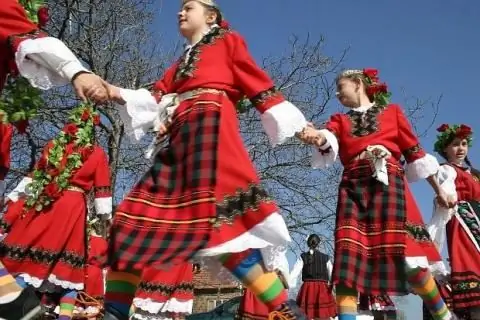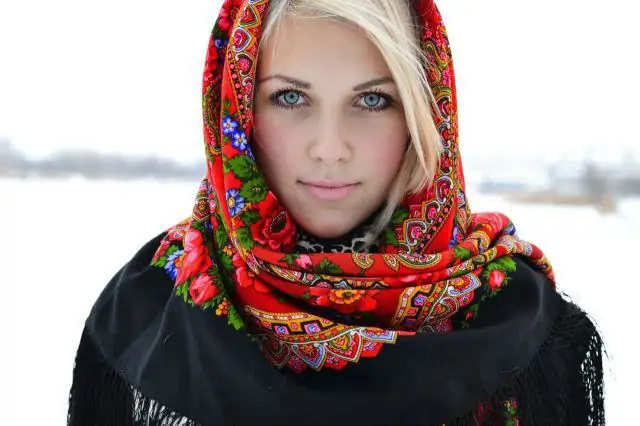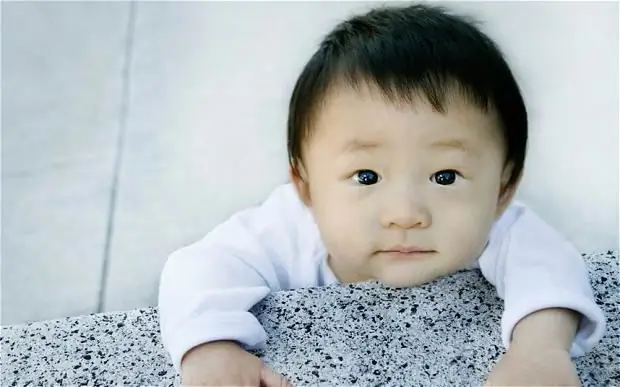- Author Henry Conors conors@fashionrebelsbook.com.
- Public 2024-02-12 02:43.
- Last modified 2025-01-23 09:07.
A curious fact: how much of what we consider native, ours, by origin turns out to be borrowed. Take, for example, such "originally Russian" names as Olga (Scandinavian), Ekaterina (Greek), Maria (Hebrew) or Vadim (borrowed from Arabic), Pavel (Latin) … The fact is that with the adoption of Christianity in

Rus has changed and the tradition of naming. And before that, the composition of the names was influenced by the Varangians - hence the large number of Scandinavian in origin (Igor, Oleg).
True Slavic names remained forgotten for a long time. After all, after the baptism of Russia, the children were not called arbitrarily, not by choice, but according to the holy calendar. Originally Russian names were supplanted by "newfangled" Christian ones - Greek, Latin, Jewish. And only recently the tradition of naming children "in Slavic" began to revive. What are these original Russian names? First of all, they contain a "transparent" etymology. That is, their meaning is clear to us without additional interpretations. For example, Lyudmila, Svetlana,Vladimir, Velimir. With the root "-glory" (famous, glorious) there are a large number of names. This is not only Vladislav, Svyatoslav, Yaroslav, who are familiar to us. This is Wenceslav, Izyaslav, Ratislav, Pereslav. And women's: Miroslava, Putislava, Boguslav, Vedislava. Russian names contain other significant roots. For example, "yar" - from the Slavic god of the sun Yarila: Yarina, Yaroslav, Jaromir (a), Yaromil, Svetoyar, Yaropolk. With the root "light" such native Russian names (East Slavonic) are known: Svetopolk, Svetozar, Svetomir, Svetogor, Peresvet, Svetolika, Svetoslava…
When naming a baby, our distant ancestors tried to emphasize

some trait. Therefore, the kids had temporary names - rather, nicknames, which later - after many centuries - became surnames: Silent, Nezhdan, First, Tretyak. Only later, during the ritual of cutting hair, that is, when the baby was one year old, three years old, he was called again. There were also traditions of changing the name. For example, after reaching the age of majority, after recovery, after marriage in adulthood. It was believed that the name carries fate. In addition, there were certain restrictions. It was impossible to name a child after family members living in the house or older children who died. It has long been a tradition to call "grandfather", as it was believed that the share is passed down through the generation. What other original Russian names can you remember? Of course, with the root "god" ("god"): Bogdan, Bozhen, Bogolyub, Bogumil (a), Bozhidar … There were many namesand with the element of "good": Blessed, Blagomir, but more often with the East Slavic "good": Dobroslava, Dobromir, Dobromil, Dobronrav, Dobrynya. The root "love" was also common: Lubomir, Lyuboslav, Lubomysl, Lyubim, Lyubava.

Originally Russian names carried a positive message, brightly positive connotations. Therefore, roots (words) with a kind, bright meaning were most often chosen. Full Russian names most often consisted of two parts. We should also recall such wonderful anthroponyms as Radoslav, Radmir, Radosveta, Lada, Milana, Milena, Milorad, Milovan. As well as later ones (because they contain Old Slavonic disagreement) Zlatomir, Zlata, Zlatoyar, Zlatogor. The primordially Russian names Ruslan or Rostislav are still popular today, but such forgotten ones as Zabava, Boyan, Siyan, Dobrava are worthy of attention.






